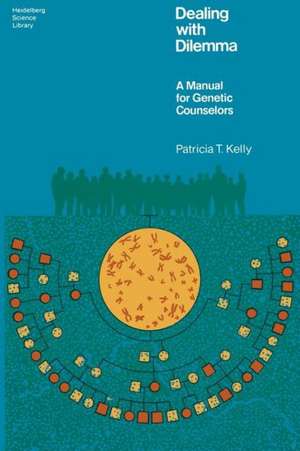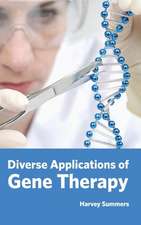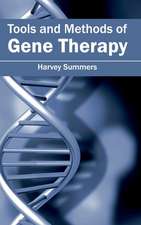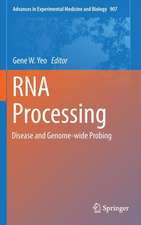Dealing with Dilemma: A Manual for Genetic Counselors: Heidelberg Science Library
Autor P. T. Kellyen Limba Engleză Paperback – 21 iul 1977
Din seria Heidelberg Science Library
- 18%
 Preț: 877.25 lei
Preț: 877.25 lei - 20%
 Preț: 324.31 lei
Preț: 324.31 lei - 15%
 Preț: 529.28 lei
Preț: 529.28 lei -
 Preț: 381.43 lei
Preț: 381.43 lei -
 Preț: 378.92 lei
Preț: 378.92 lei -
 Preț: 379.48 lei
Preț: 379.48 lei - 5%
 Preț: 365.82 lei
Preț: 365.82 lei - 20%
 Preț: 440.78 lei
Preț: 440.78 lei - 15%
 Preț: 635.80 lei
Preț: 635.80 lei - 5%
 Preț: 361.23 lei
Preț: 361.23 lei - 20%
 Preț: 322.68 lei
Preț: 322.68 lei -
 Preț: 384.86 lei
Preț: 384.86 lei - 5%
 Preț: 359.78 lei
Preț: 359.78 lei -
 Preț: 383.33 lei
Preț: 383.33 lei -
 Preț: 380.25 lei
Preț: 380.25 lei -
 Preț: 384.48 lei
Preț: 384.48 lei -
 Preț: 385.62 lei
Preț: 385.62 lei -
 Preț: 385.08 lei
Preț: 385.08 lei - 15%
 Preț: 632.37 lei
Preț: 632.37 lei -
 Preț: 389.70 lei
Preț: 389.70 lei -
 Preț: 379.09 lei
Preț: 379.09 lei - 15%
 Preț: 580.46 lei
Preț: 580.46 lei -
 Preț: 381.81 lei
Preț: 381.81 lei
Preț: 361.23 lei
Preț vechi: 380.25 lei
-5% Nou
Puncte Express: 542
Preț estimativ în valută:
69.13€ • 71.91$ • 57.07£
69.13€ • 71.91$ • 57.07£
Carte tipărită la comandă
Livrare economică 15-29 aprilie
Preluare comenzi: 021 569.72.76
Specificații
ISBN-13: 9780387902371
ISBN-10: 0387902376
Pagini: 144
Ilustrații: XIV, 144 p.
Dimensiuni: 155 x 235 x 9 mm
Greutate: 0.23 kg
Ediția:Softcover reprint of the original 1st ed. 1977
Editura: Springer
Colecția Springer
Seria Heidelberg Science Library
Locul publicării:New York, NY, United States
ISBN-10: 0387902376
Pagini: 144
Ilustrații: XIV, 144 p.
Dimensiuni: 155 x 235 x 9 mm
Greutate: 0.23 kg
Ediția:Softcover reprint of the original 1st ed. 1977
Editura: Springer
Colecția Springer
Seria Heidelberg Science Library
Locul publicării:New York, NY, United States
Public țintă
ResearchCuprins
1 Introduction.- 2 Overview of the Genetic Counseling Process.- Preparation for First Visit.- Intake Visit.- Diagnostic Visit.- Follow-up Visits.- Follow-up Letter.- 3 Intake Visit.- Providing the Family with Information about Genetic Counseling Procedures and Personnel.- Exploring the Medical and Genetic Aspects of the Disease.- Exploring the Social Aspects and Impact of the Disease.- Preparing the Family for the Diagnostic Stage—Factually.- Preparing the Family for the Diagnostic Stage—Emotionally.- 4 Diagnostic Visit.- The Setting.- Timing.- Tact.- Concern for the Client in the Organization of Routines.- Modes of Inheritance and Chromosomal Disorders.- Chromosomal Disorders.- Dominant Disorders.- Recessive Disorders.- X-linked Disorders.- Polygenic Disorders.- Diagnosis Uncertain.- Probability and Statistics.- 5 Follow-up Visits.- Areas Covered in Follow-up Visits.- The Main Purposes of Follow-up Visits.- Transcript of a Follow-up Visit.- 6 Emotional and Social Reactions to Genetic Disease.- Stigma.- Chronic sorrow.- Anger.- Guilt.- Poor Self-image.- Blame.- Embarrassment.- Feelings of Selfishness.- Fear of Genetic Counseling.- Denial.- Coping.- 7 Genetic Counseling Techniques.- Considerations Before the First Session.- Opening the Session.- The Body of the Interview.- Closing the Interview.- Specific Approaches to Counseling.- 8 Sociological Aspects of Genetic Counseling.- Reactions of Patients or Clients.- Doctor-Patient Communication.- Medicine’s Changing Emphasis.- 9 Questions Genetic Counselors Ask.- Question 1: How can I tell what people really want from genetic counseling?.- Question 2: Some people are very uncommunicative. How can I encourage them to talk?.- Question 3: How can I keep one member of a family from monopolizing the conversation?.- Question4: How can I learn more about the people I am counseling if people act as if I am prying?.- Question 5: What if I ask a question and the individual does not answer it, but talks about something else?.- Question 6: Once people start talking about their feelings and emotions, how can I get them to stop?.- Question 7: What can I do when someone cries?.- Question 8: What can I do when people get angry at me?.- Question 9: What can I do when family members get angry at each other?.- Question 10: What can I do when spouses disagree?.- Question 11: How can I handle my own feelings of insecurity as I counsel?.- Question 12: If I feel the family needs more counseling help than I can give, how do I refer them to a mental health expert?.- Question 13: What can I say when people ask what I would do in a given situation?.- Question 14: How can silence be used?.- Question 15: Sometimes people who seek genetic counseling act as if they were at a party. What can I do?.- Question 16: Is it necessary for both members of a couple to be present?.- Appendix A: Intake and Follow-up Interview Schedules.- Intake Interview.- Follow-up Interview.- Appendix B: Glossary of Genetic Diseases.













